Kate McGrew, active sex worker and director of the Sex Workers Alliance Ireland (SWAI) said “The crime of so-called brothel-keeping punishes sex workers for working together for safety. If a worker shares a space with another worker she is breaking the law. This law has been almost exclusively used to prosecute young, migrant sex workers.
Sex work is legal in Ireland but only if you work alone. A sex worker cannot work legally and work with a friend for safety. What other job, or economic activity requires you to work alone to be legal? Working alone makes sex workers vulnerable to criminals who target them precisely because they are on their own. Sharing a space with another worker for safety may also make those workers vulnerable to attack as sex workers fear that they will be arrested, not the assaulter, should they call the Gardaí. As highlighted by the recently published reports by HIV Ireland, the law has made sex workers less likely to report to the Gardaí even when they have been raped.”
She continues “Violent crime against sex workers is up 92% since the Nordic Model was introduced in Ireland in 2017 which may explain why the sex worker involved in this case was in possession of pepper spray. Pepper spray is legal to carry in other countries in the EU.
SWAI understands that the woman did not have legal representation in court which casts doubt on whether she received due process. The lack of legal representation is a common and concerning feature of prosecutions of sex workers.
Being prosecuted for working together for safety can have devastating effects on a sex worker’s life. A criminal record can affect other job opportunities or housing security. Sex workers are also affected by our current housing crisis and impending recession and during the pandemic, many were not able to give up working. Sex workers need better protections, not just policing.
A review of the laws governing sex work is currently underway. Despite several attempts at getting clarification from the Department of Justice SWAI are still unsure as to whether the brothel-keeping laws will be examined under this review. Legal avenues for co-working with another worker for safety is just one way in which the lives and safety of sex workers could be improved. SWAI calls for the decriminalisation of sex work as a matter of urgency so that we can be safe and heard about the reality of our lives.”
The Sex Workers Alliance Ireland is a peer-led service for anyone who sells sexual services in Ireland. Please contact us at [email protected] or 085 824 9305 if you are a sex worker and need our help.
#DecrimforSafety #SupportSafeSexWork

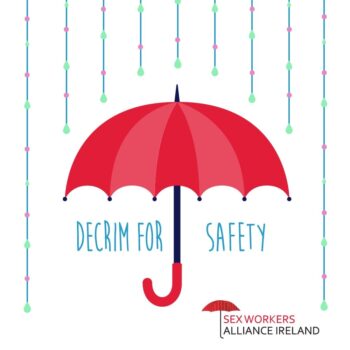
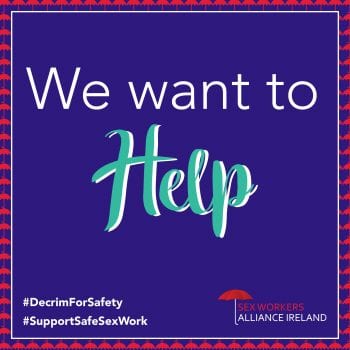 Today, 30th July is World Day Against Trafficking in Persons. Falling from Tier 1 to Tier 2 Watchlist in the Trafficking in Person’s Report since the purchase of sex law was introduced shows that Ireland is not utilising its best weapon against sex trafficking: sex workers themselves
Today, 30th July is World Day Against Trafficking in Persons. Falling from Tier 1 to Tier 2 Watchlist in the Trafficking in Person’s Report since the purchase of sex law was introduced shows that Ireland is not utilising its best weapon against sex trafficking: sex workers themselves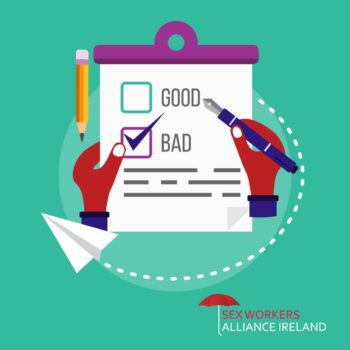
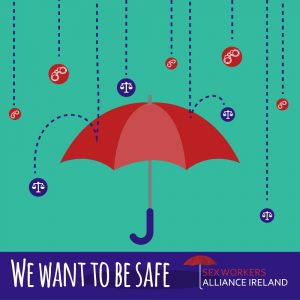 “When sex workers work together with Gardaí we can make society better,” says Kate McGrew, current sex worker and director of the Sex Workers Alliance Ireland (SWAI) commenting on two court cases involving attacks on sex workers which were reported on today.
“When sex workers work together with Gardaí we can make society better,” says Kate McGrew, current sex worker and director of the Sex Workers Alliance Ireland (SWAI) commenting on two court cases involving attacks on sex workers which were reported on today.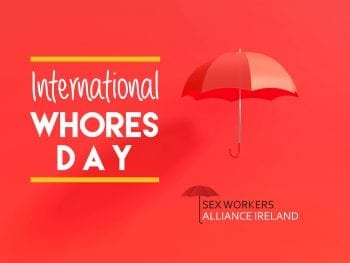 “Today is International Sex Workers Day and we are marking it while slowly emerging from the throes of a global pandemic”, says Kate McGrew, current sex worker and director of the Sex Workers Alliance Ireland (SWAI).
“Today is International Sex Workers Day and we are marking it while slowly emerging from the throes of a global pandemic”, says Kate McGrew, current sex worker and director of the Sex Workers Alliance Ireland (SWAI).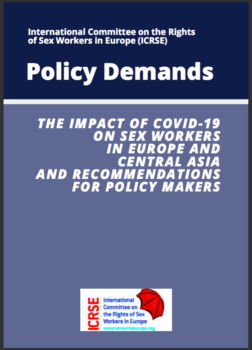
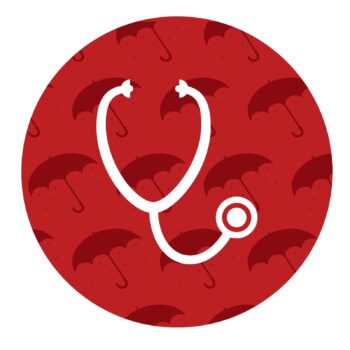 Kate McGrew current sex worker, director of The Sex Workers Alliance Ireland (SWAI) and co-convenor of the European Network for Sex Workers’ Rights (ICRSE) is calling for the Irish government to urgently act to ensure that sex workers, along with their families and communities, can access social protections during the COVID-19 pandemic. She says “As more countries impose lockdowns, self-isolation and travel restrictions many sex workers will lose most, or all, of their income and face financial hardship, increased vulnerability, destitution or homelessness. The clandestine nature of sex work also means that many will be unable to access the safeguards provided for other workers, such as sick pay.”
Kate McGrew current sex worker, director of The Sex Workers Alliance Ireland (SWAI) and co-convenor of the European Network for Sex Workers’ Rights (ICRSE) is calling for the Irish government to urgently act to ensure that sex workers, along with their families and communities, can access social protections during the COVID-19 pandemic. She says “As more countries impose lockdowns, self-isolation and travel restrictions many sex workers will lose most, or all, of their income and face financial hardship, increased vulnerability, destitution or homelessness. The clandestine nature of sex work also means that many will be unable to access the safeguards provided for other workers, such as sick pay.” 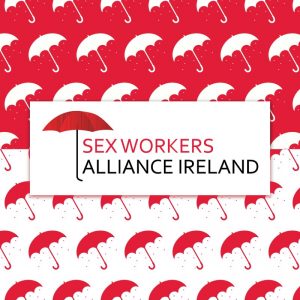 We want to work with Gardaí so that crimes like these can come to justice
We want to work with Gardaí so that crimes like these can come to justice